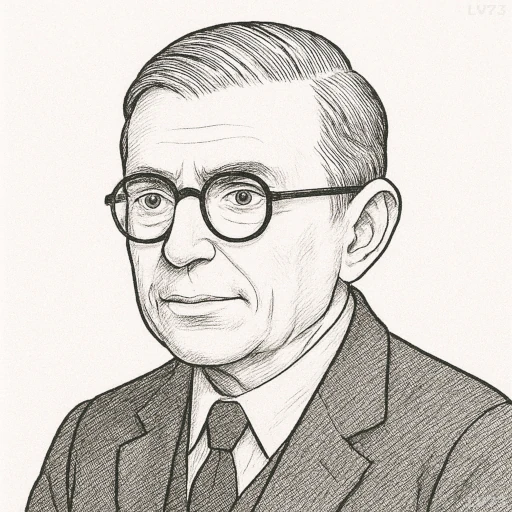“The existentialist says at once that man is anguish.”

- June 21, 1905 – April 15, 1980
- Born in France
- Philosopher, novelist, playwright
table of contents
Quote
“The existentialist says at once that man is anguish.”
Explanation
In this quote, Sartre is highlighting a central element of existentialist philosophy: the anguish that comes with the realization of human freedom and responsibility. The existentialist view asserts that human beings are fundamentally free to make choices and define their own existence, but this freedom also comes with the burden of responsibility—a realization that can cause deep anxiety or anguish. For Sartre, anguish is not merely a transient emotion, but a profound and inescapable aspect of the human condition. It arises from the awareness that every choice we make is an expression of our freedom, and through our choices, we not only define ourselves but also set an example for all of humanity. This awareness of freedom and responsibility can be overwhelming, as it forces us to confront the uncertainty and moral weight of every action we take.
Sartre’s existentialism suggests that humans are thrown into existence without inherent meaning or guidance, and they must create meaning through their actions. The anguish that comes from this realization is the result of recognizing that we are not determined by any external authority, be it society, religion, or fate. We must navigate the world alone, and our choices carry significant moral implications. Anguish, then, is the emotional response to this radical freedom and the weight of self-definition.
In modern contexts, this quote resonates with the existential crises many individuals face today, particularly in a world where traditional structures of meaning (such as religion, social roles, or political ideologies) have been questioned or undermined. Sartre’s words encourage us to acknowledge the freedom and responsibility that come with being human, and to confront the anguish that arises from our capacity to choose and create meaning in an often uncertain and chaotic world. Far from being a source of despair, this anguish can also be seen as a call to action, a challenge to live authentically and embrace the freedom to shape our own existence.
Would you like to share your impressions or related stories about this quote in the comments section?
